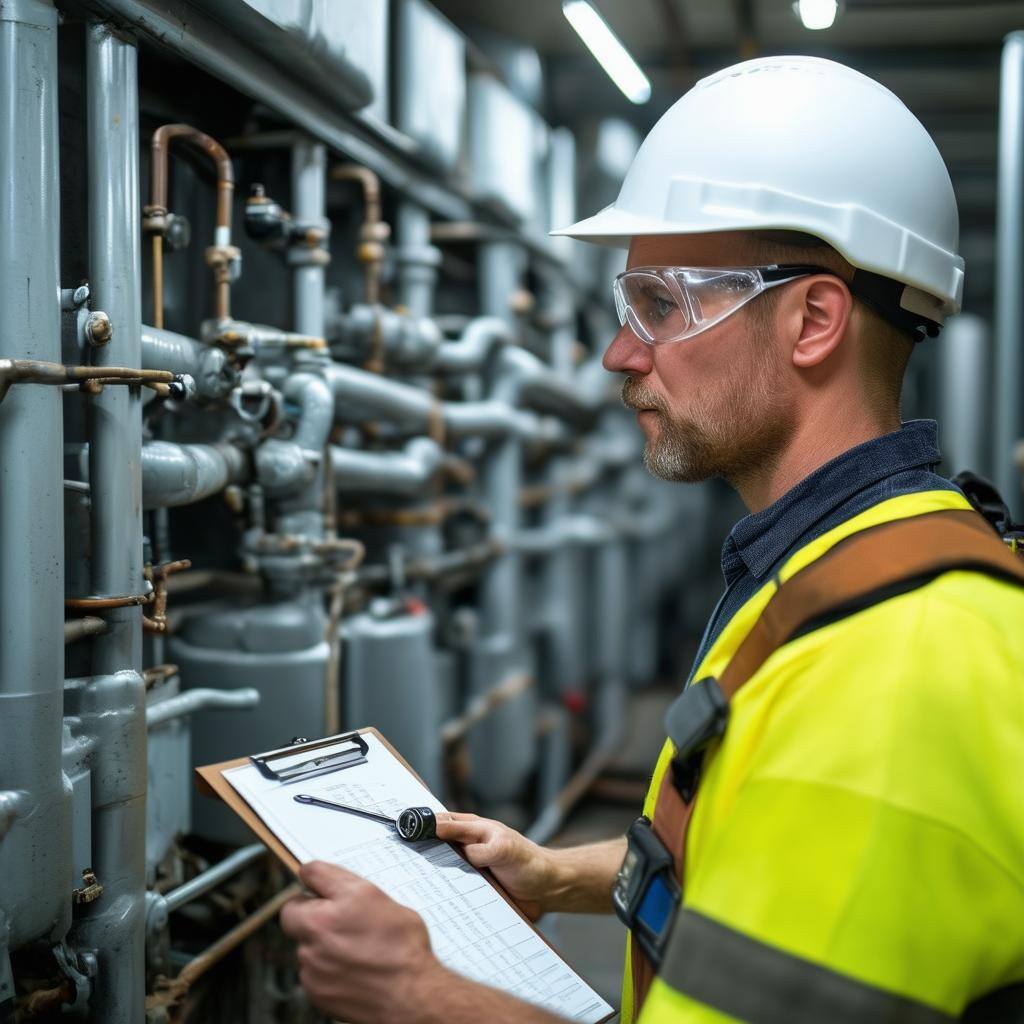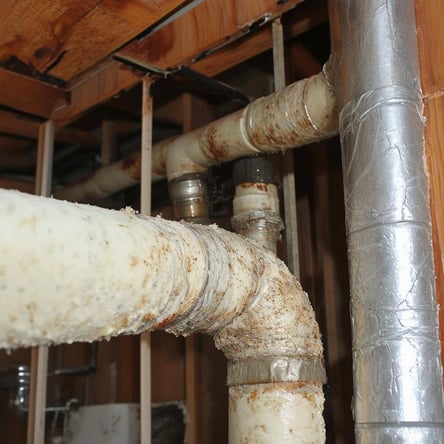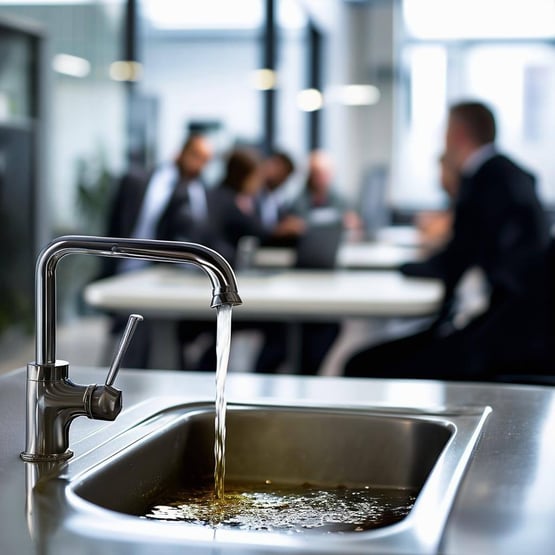7 Problems with Skipping Preventative Maintenance on Commercial Plumbing
January 14th, 2025
4 min read
By David Hurley

Are you finding yourself paying large amounts of money on emergency plumbing repairs? What about constant small issues in your building you just cannot get ahead of? Our service department has heard it all and has fixed it all. Consider a preventative maintenance contract with a plumbing company, like we have at Harold Brothers, which will help you keep up with all of your needs as a commercial property owner. Investing in a contract will save you a lot of money and stress over time.
Preventative maintenance is an important aspect of ensuring the efficiency and safety of any commercial plumbing system. Neglecting this essential routine can lead to costly, inconvenient, and even hazardous outcomes. Below, we will discuss seven different points to help make your life much easier by preventing plumbing emergencies in your building
1. Increased Risk of Pipe Leaks and Bursts
 Small issues such as corrosion, weak joints, or pipe cracking can go unnoticed if you don’t check them regularly. These incidents can cause extensive water damage to your property when pipes eventually fail and burst, disrupting business operations and requiring expensive emergency repairs. Pipe corrosion will eventually lead to leaks.
Small issues such as corrosion, weak joints, or pipe cracking can go unnoticed if you don’t check them regularly. These incidents can cause extensive water damage to your property when pipes eventually fail and burst, disrupting business operations and requiring expensive emergency repairs. Pipe corrosion will eventually lead to leaks.
If you are concerned about leaks in your building's plumbing system, walk the piping, and check the insulation and ceiling tiles for wet spots and signs of water damage.
2. Drain Clogs and Sewage Backups
Commercial plumbing systems often handle heavy use due to high occupancy or frequent customer traffic. Without cleaning and inspections, debris, grease, and waste can accumulate in pipes over time.
This buildup can lead to persistent clogs, slow drainage, or complete blockages. When drains don’t function properly, it can create an unsanitary environment and inconvenience employees, customers, and anyone else in the building.
A neglected sewer line can develop cracks, creating unpleasant and hazardous sewage backups. These incidents can cause significant property damage, disrupt business operations, and pose health risks due to exposure to sewage. The cleanup process is often extensive and expensive, requiring professional sanitation services.
3. Water Quality Issues

Neglecting your plumbing system can lead to problems with the quality of your building's water, which can cause serious health and safety issues. Corroded pipes can introduce rust, sediment, and contaminants into the water supply.
Meanwhile, stagnant water in the system's unused or poorly maintained sections can become a breeding ground for bacteria. These issues pose health risks and can result in regulatory penalties. Routine maintenance ensures your water remains clean, safe, and compliant with health standards.
4. Plumbing Fixture Failures
Fixtures such as faucets, toilets, and water heaters are subject to wear and tear from constant use. That wear and tear can sometimes become a more significant issue on your appliance, but a fixture failure is usually due to the equipment reaching the end of its lifespan.
A routine check is always beneficial to catch minor issues before they grow into larger ones and prevent emergency calls to your plumber.
5. Emergency Repair Costs Are More Expensive Than Preventative Maintenance
Emergency plumbing repairs are almost always more costly than routine maintenance. When plumbing issues escalate to failure, they often require immediate attention. Those repairs could mean higher labor costs and premium charges for after-hours services.
Additionally, emergency repairs may result in downtime that impacts your business operations and revenue. By keeping up with your plumbing system, you can avoid these sudden expenses and ensure that everything operates smoothly without interruptions.
6. Regulatory Non-Compliance
Commercial plumbing systems must adhere to specific codes and regulations to ensure safety and functionality. Neglecting maintenance can result in non-compliance, leading to fines, legal liabilities, or even forced shutdowns until necessary repairs are made.
Regular inspections and maintenance help will ensure that your plumbing system meets all regulatory requirements, providing peace of mind and avoiding potential penalties. Staying compliant also reflects positively on your business's commitment to safety and professionalism.
7. Shortened Lifespan of Plumbing System
Skipping Preventative maintenance significantly reduces the overall lifespan of your plumbing infrastructure. Pipes, fixtures, and equipment not regularly inspected and maintained are more likely to fail prematurely, making frequent replacements necessary.
Proactive care, such as routine inspections, cleaning, and minor repairs, can extend the durability of your plumbing system. This approach saves money and ensures that your system continues to perform reliably for years to come.
Why Preventative Maintenance Matters
Preventative maintenance is an investment in the longevity and reliability of your commercial plumbing system. By addressing potential issues early, you can avoid the disruptive consequences.
Establishing a maintenance schedule tailored to your needs can help ensure your plumbing system remains in optimal condition. Regular inspections by licensed plumbers, routine cleaning of drains and sewer lines, and timely repairs of worn-out systems are key components of a successful maintenance plan. You can also get your hands on an operations and maintenance manual. It will provide you with the proper maintenance schedule and information to ensure you know how to properly care for your equipment. Having this knowledge can help prevent any emergency work from needing to be done, which is much more expensive than keeping up with your maintenance and paying up front.
Practical Tips for Implementing Preventative Maintenance
To implement an effective Preventative maintenance program, consider the following steps:
- Schedule Regular Inspections: Partner with a professional plumbing service to conduct routine inspections and identify potential problems before they escalate.
- Clean Drains and Sewer Lines: Prevent clogs and blockages by scheduling periodic cleanings of your drainage system.
- Monitor Water Usage: Make sure to go over your water bills and look for unexpected price increases that could indicate hidden leaks.
- Inspect Fixtures and Equipment: Regularly check faucets, toilets, water heaters, and other fixtures for signs of wear or malfunction.
- Test Backflow Prevention Devices: Ensure these devices function correctly to maintain water quality and compliance.
- Train Staff: Educate employees on proper plumbing use and encourage them to report issues promptly.
- Review Operations and Maintenance Manual: If you own an O&M manual, check it to get the manufacturer's recommendations for specific pieces of equipment. To implement an effective Preventative maintenance program, consider the following steps:
Investing in plumbing Preventative maintenance for your building is a wise decision that pays off in the long run. It reduces costs over time, minimizes disruptions, and ensures the safety and satisfaction of all building occupants. By taking proactive measures and partnering with qualified plumbing professionals, you can prevent these issues and keep your plumbing system running smoothly for years. As mentioned previously, Harold Brothers has an excellent Preventative maintenance contract created to benefit you and your plumbing needs. Remember, the key to a reliable plumbing system is addressing minor problems before they become big ones. Now that you know some issues that could arise out of the blue, it’s time to be proactive and do what’s best for you and your property.